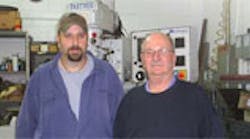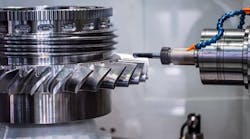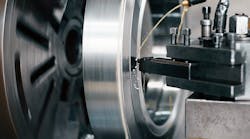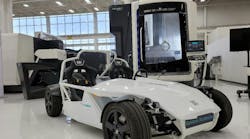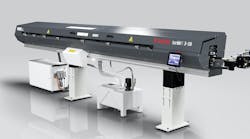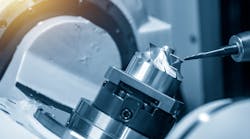The story at Madison Tool & Die Inc., in Painesville, Oh., is one that holds true for a great many other small shops across the United States. Small U.S. shops are really feeling the pinch of the current economic conditions, especially those shops that depend on a few large neighboring manufacturers for the bulk of their work. However, the story doesn’t end there because even though shops such as Madison Tool & Die are struggling, they refuse to call it quits.
In business for 38 years, Madison Tool & Die got its start machining aluminum and stainless steel parts for labeling machines produced by a local manufacturer. As the shop grew to six employees, it won more work from new customers and began manufacturing exhaust systems for semi trucks, special pins for military vehicle tow bars, and components for optical systems used in doctors’ offices. Business was good at Madison Tool & Die, up until about two years ago.
“We still have the same amount of customers, just less work coming in from them. Lot sizes for incoming jobs have dropped by 50 percent,” said Craig Graniteo, shop manager at Madison Tool & Die. “We’ve got some work now, but it’s nothing compared with how it once was. As recently as two years ago, we’d have a backlog of jobs.”
At present, the shop employs four people and gets jobs through existing customers and by word-of-mouth. Its markets still involve trucking, defense, and medical, and Graniteo hopes to add sporting goods to that list. Specifically, he’d like to produce components for archery equipment, as he is an avid bow hunter.
For its local trucking customers, Madison Tool & Die does a lot of repair work, as opposed to component work. For box trucks and older vehicles though, the shop produces bumpers and snow plows.
The shop welds, primes and applies rubber stripping to the approximately 150 bumpers it produces at a time. It machines the necessary brackets and fabricates the bumpers complete, supplying a whole assembly to the customer.
While the military vehicle tow-pin job has dropped off significantly, Madison Tool & Die still wins other defense work, such as frame structures made of a special armor-proof aluminum. These structures are for mounting mine-detection systems and such onto military vehicles.
These armor-proof aluminum jobs are all new, since the beginning of 2009. Some work is repeat, and jobs can involve 100 or so pieces. The work requires certification, and Madison Tool & Die is certified for defense work, and as such, follows specific sets of specifications when manufacturing defense parts.
As for the tow-bar pins, the shop occasionally gets a request to machine a few, but the bulk of the job moved to another shop that employs disabled veterans. As recently as two years ago, Madison Tool & Die was producing over 2,000 tow-bar pins per week on two CNC lathes running 40 hr per week to meet the demand.
Besides defense work, medical jobs also dominate Madison Tool & Die’s incoming work orders. Unfortunately, the management acknowledges, the value of those incoming orders could be better.
“Our customers are as slow as we are,” said Chuck Graniteo, Craig’s father and vice president of Madison Tool & Die. “If things get worse, we plan to step up our job-search efforts by banging on doors and cold calling people for work.”
The shop’s manufacturing capabilities include machining, fabrication and repair work. New equipment purchases are typically based on in-coming work requirements. The capital is just not available to purchase a machine, and then to look for work to keep it running.
Two CNC lathes, a CNC vertical mill, four manual knee mills, and a manual lathe make up Madison Tool & Die’s machinery list. The two CNC lathes were purchased to support the tow-bar pin jobs.
Repair and support work for customers is still trickling in to the shop. But Craig Graniteo is skeptical about how long even that will last.
“A lot of the work has gone offshore, and that has created a ripple effect that has spread to shops like ours,” he said. “And, believe it or not, some things are actually built better these days. The machines and equipment that we used to repair on a regular basis aren’t breaking down as often as they used to. We once did a lot of replacement-part work and designing of new components. But new technology has improved our customers’ processes, so the need for replacement parts has dwindled.”
But no matter what jobs come through the door, Graniteo said that Madison Tool & Die “will continue to make it right and do whatever it takes to make the customer happy.
“We’ll work with them to ensure it’s exactly what they want,” Graniteo promised, “and they will get it when they want it.”
